CHRISTIAN LIFE & GROWTH
Why does God chastise us?
By Gloria Small

In Hebrews 12:3-15, the writer uses a parenthetic to explain how the LORD deals with us in grace. The words "chastening," "chastens," or "chastened" in Hebrews chapter 12 come from a Greek root that means dealing with children, and includes training, education, correction, and teaching, which are all part of the nurture that a good parent gives to the children that they love. In this passage, we are told that the LORD only chastens or child-trains those that He loves. Then we read that those He loves may indeed receive a "scourging." But, does a loving parent start out with stripping the skin off of the back of their child? No. Scourging is often a final discipline that comes when a believer is so rebellious that although God loves them, He must deal with them in a painful way meant to gain their attention.
God deals with the believer in Christ as a child; 1 John tells us the believer sins and God then deals with us as children. We also remember that as children we have propitiation (Romans 3:2; Hebrews 9:5; 1 John 2:1-2), and our advocate when we sin is the LORD Jesus. If we are "exercised" or trained or taught by our correction, that yields the peaceable fruit of a right relationship with God. The key here is that God is not capricious and does not heap chastisement upon us without reason. What reason? We sin. And when we sin, we need to confess and put ourselves into a right relationship. The end of the parenthetic in Hebrews 12:15 is a verse that some take out of context to say that if we are not exercised by child training from the LORD then we are lost. However, the phrase "fail of the grace of God" does not mean that we are lost; it simply means that we have not chosen to take full advantage, use or enjoy the benefits of God's child-training by allowing ourselves to be corrected and taught. How are we taught? By focusing on and applying the Word of God (Romans 10:17; 2 Timothy 2:15; 2 Timothy 3:16-17; Hebrews 5:13-14)!
Therefore, rather than to be confused and try to "pin" our child-training on some specific sin, we walk in fellowship and when we sin. God is faithful and He works through circumstances and situations to bring us to knowledge of His grace. God's training of us is not to make us fear nor is it ever purposeless. What is more, much of what we think of as God chastening may merely be self-inflicted misery that is a consequence of our own choice to sin. However, if that misery causes us to examine ourselves and to inquire of the LORD and confess when the Spirit is faithful to convict and convince us of sin, then it serves its purpose and we gain insight.
We also need to understand that some of the suffering that believers may do after they are born again, and mistake for chastening, is a carryover from choices from the past. God can and does mitigate those consequences and He forgives perfectly and supplies us grace to stand through them, but they are a natural result of choices. The issue here is that when the believer is chastened, we should not fear but be blessed and understand that God loves us enough to correct and teach us. And, we may not understand why at first, but as we rest in God and in His resources, He is able to give us peace of heart in the midst of the "all things" that we are going through.
So then, all of God's child-training has a purpose, and as obedient children we accept it from the hand of the God Who loves us with grace and strength that He supplies to us. A good example of "child-training" for a purpose is found in 2 Corinthians 12:1-10 and the Apostle Paul's sharing with us what he learned about his thorn. The Apostle was not being child-trained for sin here, he was being child-trained to prevent him from sinning and exalting himself "above measure," or allowing his ego to make him proud for something that was his entirely because of God's grace (1 Corinthians 4:7). The LORD allowed the Apostle to come to realize that whatever state he was in, God's grace and strength was also with him. So then, child-training or chastisement can also be protection for the child of God. How grateful we should be for this truth. What great love and grace we have as children of our sovereign LORD!
Image Credit: Ken Wilcox; "Time out, in the corner"; Creative Commons
Tags: Biblical-Truth | Christian-Life | God-Father | Hardships | Sin-Evil
comments powered by Disqus
Published on 2-22-16

